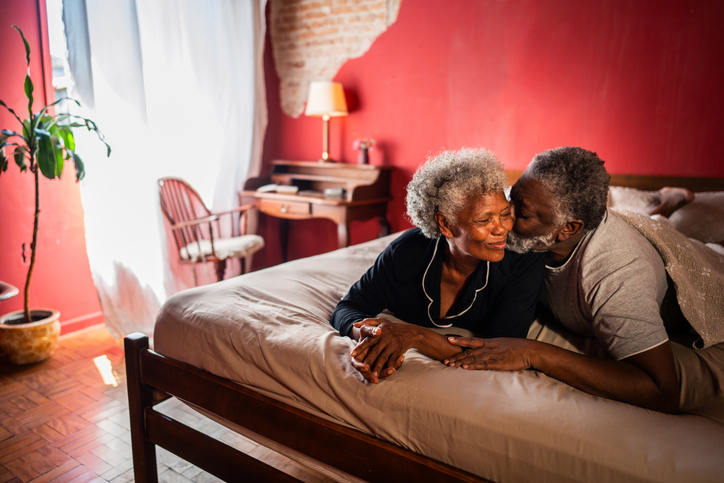How An Active Sex Life May Delay Menopause
Hot In More Ways Than One? An Active Sex Life May Delay Menopause

Source: Rick Gomez / Getty
If you enjoy an active sex life, it might be benefiting your menstrual health in more ways than you think. Studies suggest that maintaining a healthy sex life could help delay the onset of menopause, the stage in a woman’s life when her menstrual periods stop permanently, and she can no longer become pregnant.
A 2020 study from University College London revealed that women who have sex once a week, or even just once a month, are less likely to experience early menopause compared to those with less frequent sexual activity. Specifically, the research showed that women of all ages who had sex weekly were 28% less likely to go through early menopause than those who engaged in sex less than once a month. Furthermore, women who had sex once a month were 19% less likely to enter menopause early than those with even less frequent activity.
RELATED CONTENT: New Study: Menopausal Women Experience Negative Hormone Effects From Ages 40 – 55

Source: JLco – Julia Amaral / Getty
The data for the study was drawn from 2,936 women participating in the Study of Women’s Health Across the Nation (SWAN), an ongoing, community-based, multi-site, longitudinal cohort study in the United States. Researchers aimed to explore the relationship between age at natural menopause (ANM) and sexual frequency. To do this, they created a time-varying “sex index” based on the women’s responses to questions about their sexual behavior, which included questions about the frequency of their sexual activity over the last six months and whether they had engaged in sexual touching, caressing, oral sex, or sexual intercourse (not at all; once or twice a month; about once a week; more than once a week; daily). Interestingly, participants were also asked if they had engaged in masturbation (self-stimulation).
Notably, the average age at the first interview was 45.88 years. As per the inclusion criteria for SWAN, none of the participants had yet reached menopause at the start of the study. However, 46% were in early peri-menopause, while 54% were pre-menopausal. Over the course of the 10-year follow-up period, 1,324 women (45% of the original sample of 2,936) went on to experience natural menopause, with the average age of onset being 52, University College London researchers noted.
What is the average age for menopause?

Source: FG Trade / Getty
According to the National Institute on Aging, a woman is officially considered to be in menopause after having gone 12 consecutive months without a period. In the United States, the average age for menopause is 52, but that age can vary for some individuals. According to Yale Medicine, “early menopause” refers to menopause occurring between the ages of 40 and 45, while “premature menopause” is defined as menopause happening before the age of 40.
Women typically begin their menopausal transition between the ages of 45 and 55, a phase that can last several years. During this time, fluctuating hormone levels and irregular periods are common, and many women experience uncomfortable symptoms such as hot flashes, night sweats, mood swings, pain during sex, and irritability.

Source: John Giustina / Getty
“Menopause is, of course, an inevitability for women, and there is no behavioral intervention that will prevent reproductive cessation,” said Ruth Mace, a co-author of the unique study emphasized in an interview with the New York Post published Feb. 14. “Nonetheless, these results are an initial indication that menopause timing may be adaptive in response to the likelihood of becoming pregnant.”
Black women may benefit from maintaining a healthy sex life leading up to menopause, as they often enter menopause earlier and experience more severe symptoms compared to other ethnic groups. A 2023 study from SWAN found that Black women enter menopause an average of 8.5 months earlier than white women. Additionally, Black women are more likely to experience symptoms such as hot flashes, significant depressive symptoms, and sleep disturbances during this transition.
RELATED CONTENT: Well Damn! Menopause Is Worse For Black Women



